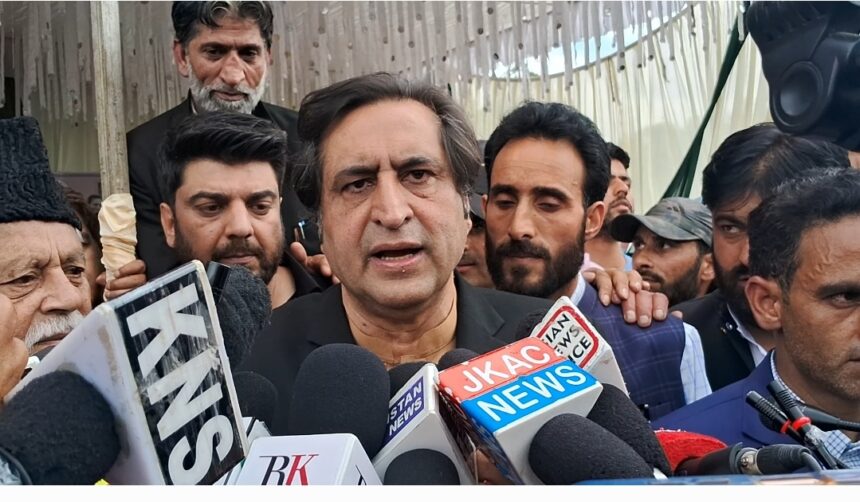‘Who Speaks for Kashmir?’ Why Statehood Can’t Be Decided by Strangers in Court
Javid Amin | Srinagar | August 14, 2025
People’s Conference chairman Sajad Lone on Thursday voiced sharp concerns over the way the ongoing Supreme Court case on restoration of Jammu & Kashmir’s statehood is being pursued, questioning both the petitioners’ legitimacy and the legal representation.
In a strongly worded statement, Lone said that allowing “Tom, Dick, Harry” to directly approach the Supreme Court on matters of such constitutional gravity could set a “very, very dangerous” precedent.
“Who is presenting our case? Who is the lawyer? Is he competent and honest in representing us? And how will the Supreme Court intervene and take a decision on such an important matter without seeking the opinion of the elected government or the assembly?” Lone asked.
Concerns Over Petitioners’ Mandate
Referring to the current petition filed by academician Zahoor Ahmad Bhat and activist Khurshaid Ahmad Malik, Lone argued that two individuals, without an institutional mandate, should not be determining the legal route for a matter “which pertains to our destiny.”
He warned that in the Kashmir context, “petitioners will be invented” if the political class does not take charge of legal strategy.
Criticism of the Chief Minister and Call for Unity
Lone, who has served as a minister in past coalition governments, directed pointed advice to the Chief Minister:
“You have dealt with BJP in the past. I too have dealt with them. One unsolicited advice: when talking to them, what matters is not what they tell you — what matters is what they don’t tell you.”
He accused the government of persecuting opposition leaders, ordering punitive transfers, and failing to unite political forces on the statehood issue.
Instead, Lone urged the CM to:
-
Stop political vendettas
-
Restrain ministers from controversial actions (“you know what I mean”)
-
Build a common front for statehood
Push for an Assembly Resolution
In a direct challenge to the government’s approach, Lone said the Assembly — not the Cabinet — is the proper institution to represent the will of the people on statehood.
“You could have sent that resolution to the Supreme Court today if you had allowed us to pass it,” Lone said. “Call an emergency session in the next two days and let us pass a resolution.”
This, he suggested, would give the Court a clear, collective voice from J&K’s elected representatives rather than relying solely on individual petitions.
Backdrop: Supreme Court Hearing Today
Lone’s remarks come on the same day the Supreme Court heard the plea seeking restoration of J&K’s statehood within two months. Petitioners argue that keeping the region under UT status for nearly five years violates federalism and democratic rights.
The Centre has previously assured the Court that statehood will be restored, but without committing to a timeline.
Political Implications
Lone’s intervention signals growing political unease over the way the statehood issue is being legally and strategically handled. His demand for an Assembly resolution could become a rallying point for opposition parties, potentially putting pressure on the government to take a more institutionally driven approach to the Supreme Court.
If adopted, such a resolution could strengthen J&K’s case by demonstrating unified political will — something that may carry weight with the Court when deciding a matter of deep constitutional significance.



